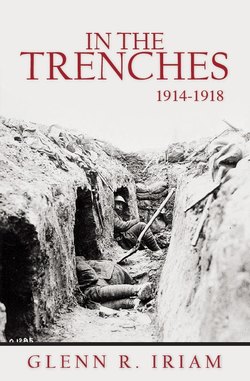Читать книгу In The Trenches 1914-1918 - Glenn Ph.D. Iriam - Страница 12
На сайте Литреса книга снята с продажи.
St. Nazaire
ОглавлениеA Co. or No. 1 Co. was left here a couple of days on account of the battalion being over strength. For this reason they could not ship us all on the regular number of cattle cars assigned to a French battalion. 42 hommes or 10 chaveaux to a car. We had to wait and follow at earliest convenience. We eventually landed in our turn and were marched through the town to a camp of tents in the suburbs.
Now St. Nazaire is an old time seaport infested with all kinds of drifting and sea going people of many nationalities and colors. Turcos, Lasgars, Maltese, Indian, Coolies, Negroes as well as the white scum of a hundred water fronts.
There is on sale at the numerous estaminets wines of all kinds, cognac, bismuth, cride, minth beers and other drinks with a kick from Algiers, Italy and other foreign parts.
There is also plentitude of women on sale to the first bidder regardless of color, cleanliness or origin of the buyer.
We had about 300 young devils in the prime of life with coin in their pockets in a new and strange land raring to go. It was some responsibility on the hands of our O. C’s to hold them for the time of our stay here and keep them out of trouble. Some of us were detailed off to act as sentries at some of the more unsavory joints to steer the boys away. I was nailed for this, my first job in La Belle France. I only had to turn away a couple of them during the night.
The last one was a lance jack or one strip corporal out of my own platoon. He had gone into some place where the inmates were all busy, or sleeping, or out. At any rate he gravitated to the kitchen part of the house and ran up against a big sideboard or chest of drawers or shelves loaded with a variety of bottles with all kinds and all degrees of kick. Being primed to a jovial and devil may care stage he proceeded to load up all the pockets of his great coat, the inner clothing with the best that the house afforded before leaving. When he passed me he had a heavy cargo and was rolling some in a light ground swell but with all sails set. He promised to go directly to his tent and did so. I helped him a little with his cargo when off duty.
On the third day we took the train and were off on the long detour by rail, three days and three nights. We were very crowded in those stock cars and found difficulty in having enough room to stretch out for a nap at night. Most of the time we were hunched up with our knees under our chins, but occasionally found a place at the side door of our Pullman where we could get a glimpse of the country. We passed through some very beautiful valleys in what I was told was Normandy. Of course all troop movements were under a very heavy and strict censorship, and we had to guess at our route and destination at all times. We were often able to pick off information en route and take note of names. While passing through the towns and while stopped in rail yards we had a chance to view the people and donate bully beef and biscuits to the swarms of pinched looking children that crowded along side with their perpetual whine of Bulee- Bif- Biskee- Pennie-Anglais-Soldat-Plees. There must have been a lot of poverty and hardship even at that early stage of the war to judge by these Waifs. We must have passed over a height of land some where in mid-trip for we climbed for several hours on steep grades. After passing through a long tunnel we came out on a different sort of country, level and flat almost like our prairie. I suppose that was our entrance to the Flanders Plains.
